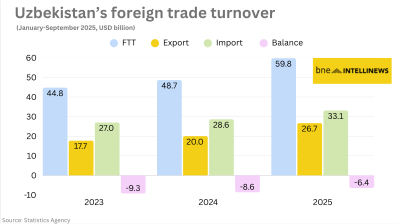Turkey’s official consumer price index (CPI) inflation stood at 39.59% y/y in May versus 44% y/y in April, the Turkish Statistical Institute (TUIK, or TurkStat) said on June 5 (chart).
On May 30, TUIK announced that it would classify the country’s household natural gas price as "zero" in calculating official consumer price index (CPI) inflation in May, following a pre-election gas giveaway by the government prior to the May national elections. It said it expected to record a sharp decline in inflation in May.
The official inflation rate as measured by TUIK peaked in October at 86%, which was the highest headline rate posted by Turkey since the 91% registered in June 1998. With the advent of December, the base effect from a year previously came into effect, pulling inflation down.
At 40%, Turkey has fallen to 13th place in the world inflation league.
The Istanbul-based ENAG inflation research group of economists, meanwhile, released an inflation figure of 109% y/y for May. The ENAG figure calculated for April was 105% y/y.
TUIK also gave an official figure of 41% y/y for producer price index (PPI) inflation in May.
In May, the central bank left its expectation for end-2023 official inflation unchanged at 22% (upper boundary: 27%).
The guidance was based on the assumption that the lira would not experience another crash. If the USD/TRY remains stable, Turkey’s official inflation figure is on course to decline to the 30-40%s across 2023.
As of June 5, the USD/TRY rate in the interbank market was up by 9% to a record TRY 21.22 from 19.49 on May 4 while free market prices at the Grand Bazaar in Istanbul were also hovering in the 21s.
Lately, the gap between the interbank and the Bazaar rates has narrowed as the government has been allowing the lira to slowly depreciate in the interbank market.
On June 3, Turkey’s re-elected president, Recep Tayyip Erdogan, named market favourite Mehmet Simsek as finance minister.
Since last week, a positivity has taken hold in media coverage of Turkey’s economic trajectory. Orthodoxy is in the house. A positive real return is on the way.
Currently, rumours suggest that Hafize Gaye Erkan, a finance industry professional who served as co-CEO at First Republic Bank in the US, will be appointed as the new central bank governor.
Prior to the latest U-turn in favour of the orthodox, a lira devaluation looked a must. Erdogan was in a position to find some fresh FX supply, with rate hikes on the cards should the unidentified capital flows and “friendly country” channels not work.
On May 25, Erdogan essentially said that he would travel to countries where he might successfully beg some more capital.
As things stand, the Erdogan regime is moving to the model where it satisfies its urgent FX needs via hot money. How long the latest honeymoon period of the Erdogan administration and the finance industry lasts will be keenly observed.
All eyes are on the policy rate. It is currently unknown whether Simsek has convinced Erdogan to hike rates. Previously, he was part of the economy team (together with Ali Babacan and then central bank governor Erdem Basci) that observers said pulled the wool over Erdogan’s eyes with the so-called interest rate corridor policy.
The headline policy rate was left unchanged while the central bank pushed banks to borrow at the late liquidity window. It translated into a de facto rate hike.
On June 5, the first reaction of the USD/TRY, spiking to a record low of 21.39 during day trading, did not suggest front-loaded portolio inflows that would shelve a devaluation. In fact, the finance industry has so far been demanding a devaluation in advance.
The visible impacts of the overvalued lira on the real economy and the gaping trade deficit suggest a devaluation is inevitable. In this case, an ongoing controlled devaluation would continue until the first monetary policy committee (MPC) meeting. Then, a front-loaded rate hike would open the doors for another flood of hot money.
The MPC will hold its next rate-setting meeting on June 22.
In the medium term, Simsek’s moves in relation to the central bank’s deeply negative FX position, the FX-protected deposits scheme (KKM), macroprudential measures and non-capital controls and the banking industry’s heavy burden will be watched and clocked.
Amid the booming lira supply and hard currency outflows via unprecedented trade deficits, officials only manage to keep something of a brake on the lira by strong-arming bankers into blocking (non-capital controls) and suppressing (macroprudential measures) domestic FX demand. Also supportive are those unidentified inflows and other support from the “friendly countries”.
Turks have been piling up cryptocurrency, cars and gold as assets. They know they need to prepare themselves for the storm that could at any time rush in from the horizon.
The FX-protected deposits scheme (KKM) introduced by Erdogan’s henchmen reached $126bn as of May 25. The KKM accounts for 24% of total deposits. The share of FX-linked deposits stands at 39%.
The central bank’s net FX reserves are in negative territory for the first time in 21 years. A record low was registered at minus $4bn on May 26. The gross reserves declined by $31bn to $98bn as of May 26 from $130bn as of February 3.
To help break FX demand, the government lately permitted local banks to introduce higher lira deposit rates. As of May 26, the weighted average lira deposit rate with maturities up to three months reached 34%.
The turbulence-free mood on the global markets, meanwhile, remains undisturbed. Turkey’s five-year credit default swaps (CDS) have fallen below the 600-level, while the yield on the Turkish government’s 10-year eurobonds is testing below the 9%-level.
On May 24, unnamed sources told Bloomberg that Turkey’s central bank asked some local lenders to buy the country’s dollar bonds to prevent a CDS spike.
Data

Turkey's central bank remains cautious, delivers 100bp rate cut
Decision comes on eve of next hearing in trial that could dislodge leadership of opposition CHP party.

Polish retail sales return to solid growth in September
Polish retail sales grew 6.4% year on year in constant prices in September, picking up from a 3.1% y/y rise in August, the statistics office GUS said.

Uzbekistan’s nine-month foreign trade nears $60bn
Export growth of 33% and import expansion of 16% y/y produce $6.4bn deficit.

Hungary’s central bank leaves rates unchanged
National Bank of Hungary expects inflation to fall back into the tolerance band by early 2026, with the 3% target sustainably achievable in early 2027 under the current strict policy settings.



